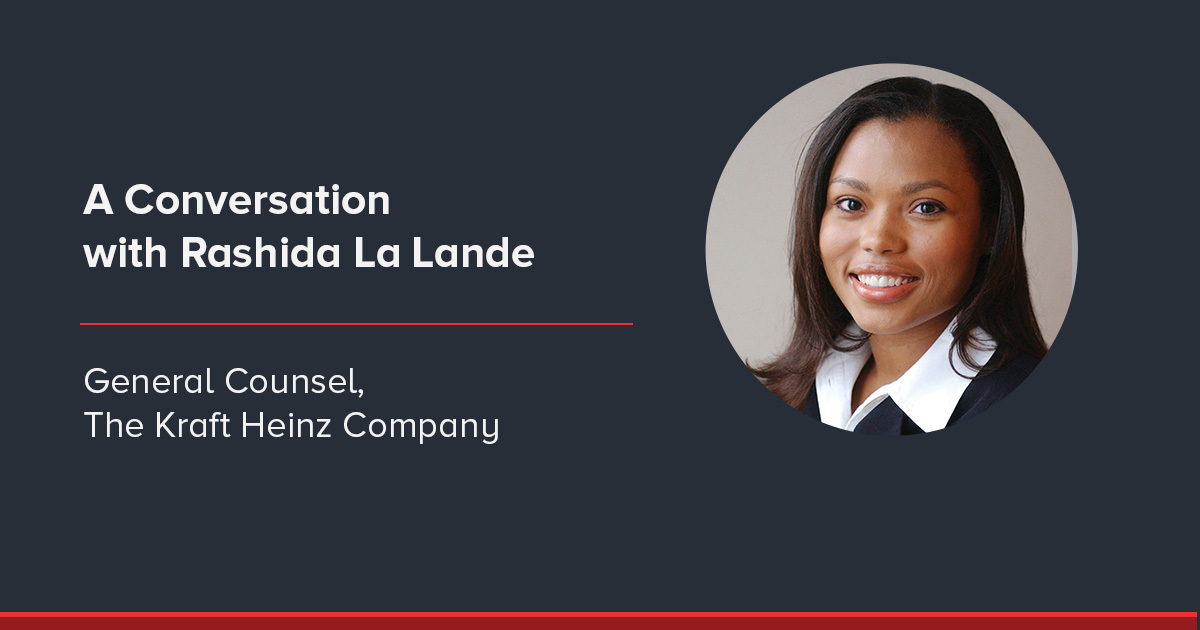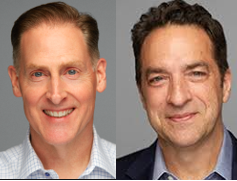In this Q&A, Merryck & Co.'s David Reimer and Adam Bryant interview Rashida La Lande, General Counsel, The Kraft Heinz Company. La Lande talks about the transition from law firm to C-suite and offers advice for new GCs.
David Reimer is the CEO of Merryck & Co Americas. Adam Bryant is a Managing Director at Merryck & Co and long-time Columnist of The New York Times' "Corner Office."
___________________
Reimer: How did you gravitate to the field of law in the first place?
La Lande: My favorite activity is doing puzzles, and the more complicated the better. I don't know if you've seen the Heinz ketchup puzzle, but it's all red, with 570 pieces. But that's my joy ' taking a really complicated situation and trying to figure out solutions and working and partnering with people in order to get there.
And I grew up in Jamaica, Queens, in a working-class African American neighborhood. I won the parent lottery. My parents are highly educated. My mother has a master's degree in education, and so does my dad, although he's an electrician by trade. I always heard about the importance of being articulate, and being a bit on the argumentative side, law was one of the options that was presented to me.
I went immediately from college to law school. But I didn't understand early on that there were types of lawyers other than litigators, because my entire understanding of the legal profession early on was shaped by shows like Law & Order. It was through law school and through some internship opportunities that I saw that there were IP lawyers, M&A lawyers and corporate lawyers. I realized that my skills were better suited to that kind of law, and I became an M&A lawyer and practiced for close to 20 years at Gibson Dunn before moving to Kraft Heinz.
Bryant: As a GC, you're now part of the C-Suite team. That's a big change.
La Lande: When you're a partner at a law firm, you're a revenue generator. You are the business. I was always hesitant to take an in-house role before because I was concerned about being moved over to the cost center, the "team of no" type of job. I've had no interest in that kind of position when opportunities were presented to me in the past.
But I was interested if it was an opportunity for me to be on the executive leadership team, to understand everything that's going on at the company, and to be as involved in helping the company grow as I am protecting the company's assets. Our CEO said that that was exactly what he was looking for.
I also said to him that the first thing I wanted to do from a business perspective was to participate in all of his meetings and just listen. I spent time listening to everyone about their issues, their concerns and what keeps them up at night ' not from a legal perspective but from their business perspective. I had nonstop meetings for the first two to three months. I traveled around the world.
One of the ways that GCs really need to work with companies now is by building trust on both sides. Your business partner has to know that if you say no, it's no — not that I said no because I want to go home and deal with my kids. It's no because there is no alternative. But when it's not no, I'm going to spend the extra time, however long it takes, to be creative, to think through different alternatives, to talk through not only what you think you want but what your ultimate goal is.
Reimer: Now that you're managing a big staff, what lessons have you learned about leadership?
La Lande: One thing I have learned is to push down the introvert in me. The way I do that is tell myself that I have to think about the people around me and the team and also the business that we represent. With the goal of making things better for a group that's larger than me, I'm able to tell myself to forget that you're shy, forget that you don't like talking in public, and do it anyway because people need to hear your direction, your guidance, and they need to hear how you're thinking about issues.
It's also about making sure that you're an active listener. Situations are not the same in every country, in every location. People are handling them and managing them differently, and cultural expectations and how you think about risk and risk management are different. I have to make sure that I'm actively listening to how people are responding and making sure that each approach is tailored to the specific needs of the region and the people who work there.
Bryant: How can the GC help board directors think about culture and risk?
La Lande: It starts with having conversations about how culture can cause and lead to certain types of risk. As I said earlier, I didn't want to just focus on risk; I want to focus on growth. You also have to think about it from the perspective of opportunity. We're not in a world where everyone's going to agree with you 100 percent of the time or anything near it, and so it's a conversation that starts with, "Here's the opportunity that is presented by our culture, here are the risks and, by the way, let's talk for a minute about what you think is the right thing regardless."
You have to be comfortable with the position you take and how you move forward, and the only way that you can get that level of comfort is if you thought it was the right approach. If you thought it was the wrong approach and you're defending it, that's a really difficult place to be in. That's the type of conversation that you have to have, both at the committee level and with the board.
Reimer: What other advice would you give to new GCs about working with boards?
La Lande: Your role is representing the company and the board and the stockholders and the different constituents of the company. The same way that I might sit and listen to the other business unit leaders about their risks and concerns and what's keeping them up at night, you have to take the time to do the same thing with the board. You need to develop individual relationships with them to understand how they're thinking, what their concerns might be, and to really anticipate what you might hear from them, and where they're going to want you to focus.Reimer: We're having a lot of conversations with leaders these days about the "tyranny of and" — this notion that there are so many competing demands. How do you think about that?
La Lande: It absolutely is a constant state, and that's not going to change. I've always been a fan of fighting the battles that can be won and accepting the battles that can't and continuing to move forward. The way I think about it is that there has to be a certain number of bright lines.
Shareholder value is something that we always have to be thinking about. We always have to be thinking about our customers, and we always have to be thinking about the health and safety of our employees. If you think about those bright lines as our areas of focus, then it makes it a lot easier to work through priorities and decisions.
Our CEO has done a really good job of laying out the vision and values for the company internally, and constantly reminding people these are the things that we are about, and these are the things that have to be on the list of to-dos that you accomplish. That allows you to steer in the appropriate direction.





